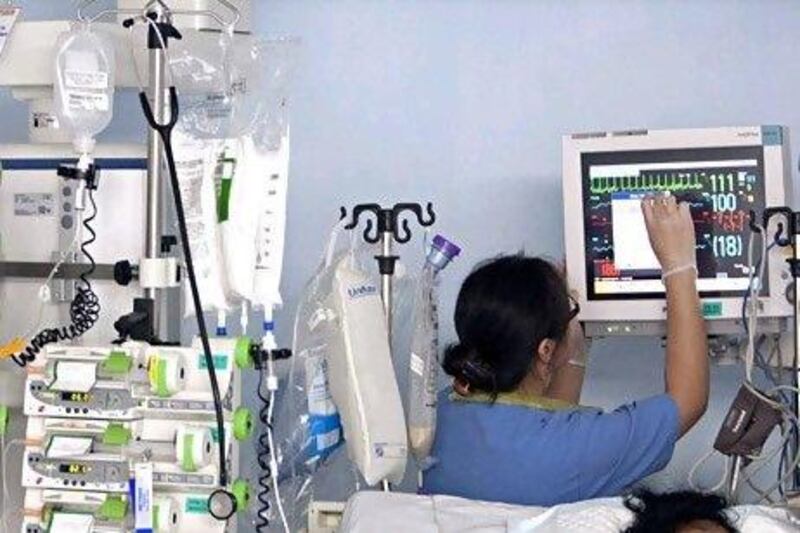When David Evans flies over from Britain and steps off the aircraft in Dubai, he typically hits the ground running with visits to local dermatologists, obstetricians and general physicians.
Mr Evans may sound like a hypochondriac, but his job is to develop business among medical professionals who might prescribe vitamins, minerals and anti-obesity supplements from Arden Healthcare.
Like many British companies, Arden moved into the Emirates just as spending on local healthcare infrastructure surged.
"What is most striking is the thirst for knowledge," says Mr Evans, who is Arden's managing director.
He predicts that products introduced this year will help the company's business grow by about 15 per cent.
As more hospitals feature plush rooms for patients, waiting areas with flat-screen televisions and even valet parking, the UAE is becoming the new trading post in the Gulf's healthcare industry.
With the industry expanding, more companies from Germany, China, the United States and the United Kingdom are coming in for a slice of this market, which is projected to grow to US$11.9 billion (Dh43.71bn) in 2015, more than triple the amount back in 2005, according to a UK Trade & Investment (UKTI) report.
This year, 214 companies from the UK turned up to exhibit their products and line up local contacts at the Arab Health congress held in Dubai.
Extract Technology was one of them. The company, which installs containment and aseptic systems in hospitals and laboratories, was looking to form business connections and find experienced distributors in the Middle East.
"There are many projects which will require our equipment now and in the future," says Stephen Carpmail, the sales manager of Extract Technology, referring to the UAE market. "We have several potential agents to contact."
Millions of dollars worth of government investment in healthcare infrastructure, low import duties and the ability to enter other regional markets make the UAE a prime destination for more than 3,000 businesses in Britain's well-developed healthcare sector.
GlaxoSmithKline is based in the UK and the leader in the UAE's pharmaceutical sector with a market share of 12 per cent.
An economic slowdown in European and US markets has also helped make the Emirates, as well as the wider GCC region, an attractive option. Already, the UAE is Britain's biggest overall export market in the Middle East and North Africa, with total exports worth £3.9bn (Dh22.66bn).
The interest UK health companies have here also stems from the fact that "no other region in the world faces such rapid growth in demand for the latest technologies", says Shushmul Maheshwari, the chief executive of RNCOS, a market research firm.
Smiths Medical is one UK company that has benefited from growth in the UAE for at least the past five years. Its market share in medical devices is now at 30 per cent, according to Philippe Laroche, the company's managing director for south Europe, the Middle East and Africa.
"I consider the UAE as a well-developed market but still there's space for some big developments and [it] is a good potential market," he says.
As competition within the UAE medical-device market increases, revenues generated by these products are projected to grow from Dh1.72bn in 2010 to Dh2.77bn by 2015, according to a report released last year by Business Monitor International. On average, the annual growth rate in this sector stands at 10 per cent, which is above that of the pharmaceutical market at 4.9 per cent.
Low import duties are also drawing in more companies. Certain products and technologies, including in vitro and diagnostics, are exempt from import tariffs.
"The UAE is a growing market where increased investment in the private and public sector is driving the demand for innovative, high-quality surgical instruments," says Alycia Burton, an export assistant at Single Use Surgical, a British company that came here in 2009 and supplies instruments used in ear, nose and throat procedures.
"We are also keen to penetrate other GCC markets, and we view the UAE as an excellent point to start."
New clinics and hospitals in Dubai and Abu Dhabi are expected to drive demand for more advanced medical equipment, particularly in high-end diagnostics.
The new Al Mafraq Hospital, the country's premier trauma centre and Abu Dhabi's largest surgical complex, opens next year. Investment in new clinical technology for the hospital reached about Dh10 million last year, according to a UKTI report.
There have been other key developments since Arden entered the UAE in 2002.
As more high-tech hospitals and advanced medical centres have opened up, better road infrastructure has made it easier to navigate the country during all those trips to doctors and healthcare professionals.
It was also "easier to see the landmarks again so we didn't get lost", says Mr Evans.
twitter: Follow and share our breaking business news. Follow us





